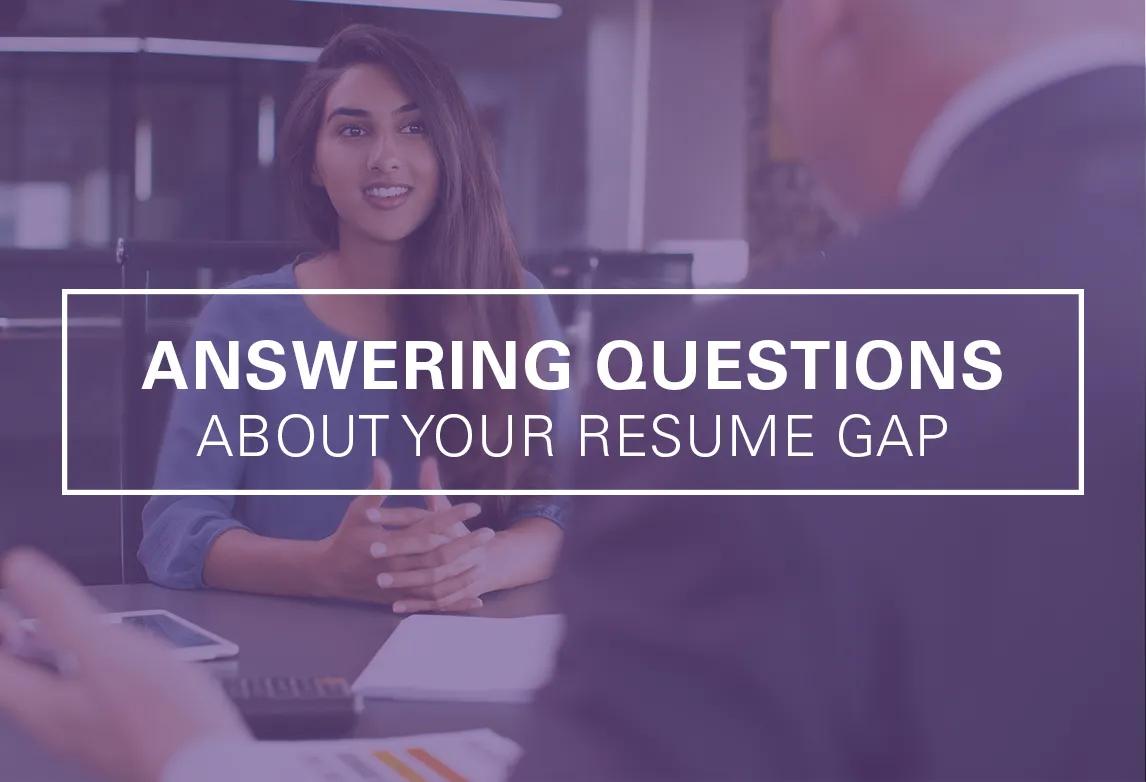4 Reasons You Have a Resume Gap—and How to Explain Each One

Job seekers have lots of reasons for resume gaps. While there are tactics you can use in your resume to minimize these gaps, employers will still likely have questions. Don’t panic—resume gaps don’t have to ruin your chances of getting a job! Just keep a cool head and answer the question in a way that shows your ability to move forward and excel at the job.
Here are four reasons you might have a resume gap and how you can explain it in an interview.
1. You started a family.
If you have a resume gap because you took time off to begin your family, you can work with that. Draw connections between the job you’re applying for and the skills you learned while caring for your children.
For example, if you’re applying to work in a medical office, you can discuss how caring for your children taught you to anticipate and respond to the needs of others—which is a great skill for an allied healthcare worker. You can say you’re passionate about caring for people, and taking care of your children has honed that passion. You’re ready to reignite your career now that your children have started school.
Don’t mention any financial or personal reason for wanting a job. For example, don’t say, “Well, I need to send my kids to college,” or “I’m dying to get out of the house and talk to adults!” These reasons might be true, but they won’t make the best impression on a potential employer. Instead, focus on how your children make you better at the job you want.
2. You cared for a sick spouse or loved one.
If you have a resume gap because you took care of a sick relative, give a quick overview about the situation. Try to avoid being emotional or going into lengthy details about the illness and its effects.
If your mother had cancer, for example, you could say, “I stopped working when it became clear my mom needed help through her treatments. I took care of her full-time for two years. Then, when she entered remission and was able to live life normally, I decided it was time to focus on my career again.”
If you’re applying for a position where you work directly with patients, you can draw a clear parallel to your experience taking care of your mother. If you’re applying for an administrative role, you can talk about how much organization and preparation goes into being an effective caretaker. Discuss how you needed to remember medication schedules, understand prescription effects, handle billing, work with the insurance company, manage doctor’s appointments, and more.
3. You switched careers and/or attended an educational institution.
You might have resume gaps because you decided to change careers. If you spent your time on educational courses and other training, that’s great experience to discuss. Talk about how your training gave you the skills and knowledge you need in your new career field. You can also discuss your reason for making the change—because you wanted to be more directly involved with patient care or because you enjoy medical coding.
If you completed an internship or externship through your school, you can also talk about this hands-on practical experience. These things can make your resume gap seem like valuable preparation time.
4. You were laid off and couldn’t find another position.
This is the toughest situation to address, but you can do it! If you were laid off and had trouble finding employment, make sure to focus on activities you completed during that time to expand your skills. Did you volunteer with a blood bank or hospital? Did you pick up some additional career training? Did you join a professional group and take on a leadership position within that group?
The key is to make those months or years seem valuable rather than wasted. Pull on any experiences that helped expand your skills and prepare you for the role you want.
Don’t focus on negative experiences. For instance, don’t say, “I was laid off unfairly and had trouble finding work after that because employers wouldn’t give me a chance.” Even if it’s true, it’s not going to impress the interviewer. Instead, focus on being positive and upbeat, and showcasing the abilities you picked up that make you perfect for the job.
It can be difficult to navigate a resume gap, particularly when the employer directly asks you about it. No matter the reason for your gap, make sure to focus on how you’re qualified and passionate about the role you want now. Tie in any experiences that make you better at the job and keep a positive attitude. If you can frame them in a positive light, employers are often willing to overlook resume gaps—no matter the reason for them.
Request Information
Talk with us. Start your journey.
Complete this form and we'll call you to explore options at UMA and answer your questions. We'll also email you info on how to get started. We're with you at every step!
Request Information
Talk with us. Start your journey.
Complete this form and we'll call you to explore options at UMA and answer your questions. We'll also email you info on how to get started. We're with you at every step!
About the Author
 Christina DeBusk
Christina DeBuskChristina DeBusk is a freelance writer who has been providing health and wellness content to healthcare organizations such as the American Chiropractic Association and International Sports Sciences Association (ISSA) since 2011. She obtained her Bachelor of Science in Sociology from Central Michigan University, minoring in psychology. She has also earned several ISSA certifications, including Certified Personal Trainer and Certified Nutrition Specialist, achieving the status of Elite Trainer.
Related Content


3 Questions to Measure Long-Term Potential in Healthcare Job Candidates
Read More